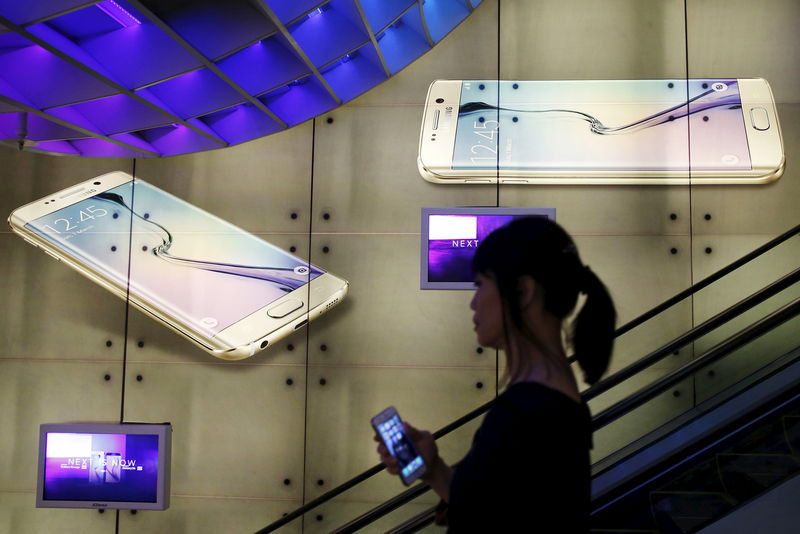By Makiko Yamazaki and Ju-min Park
TOKYO/SEOUL (Reuters) - Japan will tighten curbs on exports of high-tech materials used in smartphone displays and chips to South Korea amid a growing dispute over South Koreans forced to work for Japanese firms during World War Two, the industry ministry said on Monday, prompting condemnation from Seoul.
Tighter export controls, to become effective on Thursday, would slow the export process by several months, hitting South Korean tech giants, such as Samsung Electronics (KS:005930), SK Hynix (KS:000660) and LG Display (KS:034220).
The step comes amid Tokyo's growing frustration at what it calls a lack of action by Seoul over issues stemming from its top court ruling last October that ordered Nippon Steel (T:5401) to compensate former forced laborers.
South Korea's industry minister, Sung Yun-mo, said: "We will take necessary countermeasures including filing a complaint to the (World Trade Organization)."
"Our government expressed deep regret" over Japan's tightening of its materials shipments, Sung said.
South Korea's finance minister also called a meeting to discuss plans for reacting to Japan's move, finance ministry officials said.
The South Korean foreign ministry as well summoned Japan's ambassador and called for a withdrawal of the curbs, it said.
Japan rejected South Korea's proposal last month to create a joint compensation fund for victims with contributions from both nations' companies.
"South Korea has failed to show any satisfactory measures to resolve the forced labor issue ... and severely damaged mutual trust," said an official of the Japanese Ministry of Economy, Trade and Industry.
"As trust has been lost, we cannot have a dialogue and are unable to ensure that proper export controls are being taken," he told a news briefing.
The neighbors share a bitter history dating to the Japanese colonization of the Korean peninsula from 1910 to 1945, including forced use of labor by Japanese companies and the use of comfort women, a euphemism for girls and women, many of them Korean, forced to work in its wartime brothels.
Japan, which says the issue of forced labor was fully settled in 1965 when the two countries restored diplomatic ties, has denounced the rulings and urged the launch of an arbitration panel.
The materials to be restricted are fluorinated polyimides, used in smartphone displays, as well as resists and hydrogen fluoride (HF), which is used as an etching gas to make semiconductors.
Resists are thin layers of material used to transfer circuit patterns to a semiconductor substrate. Hydrogen fluoride is used in etching silicon materials.
Japan will stop preferential treatment for shipments of these three materials to South Korea, requiring exporters to seek permission each time they want to ship, which takes about 90 days, the ministry official said.
Japan produces about 90% of fluorinated polyimides and resists worldwide as well as about 70% of etching gas, making it difficult for chipmakers to find alternatives, said the Sankei newspaper, which reported the plans on Sunday.
A source at one of South Korea's top memory chipmakers said chipmakers would have to try to build stockpiles, adding that the company relies on Japan for more than 70 percent of its resists and etching gas.
Samsung Electronics, the world's top memory maker, said it was looking into the matter, but offered no further comment. LG Display, a Apple (O:AAPL) supplier, said in a statement that the company would see "some" impact from any trade condition changes with Japan.
SK Hynix declined comment.
Sung, the South Korean industry minister, said the country had been diversifying import sources and localizing supplies to cope with Japan's "one-sided" measure.
In Tokyo, shares of resist maker JSR (T:4185) and fluorochemicals maker Kanto Denka Kogyo (T:4047) plunged, but small South Korean material producers gained.
Japan also plans to strip white list status from South Korea under a trade control law, requiring Japanese exporters to seek a license for items that could be used in some weapons-related applications.
On Japan's white list are 27 countries, from Germany to South Korea, Britain and the United States.
South Korean exporters and experts urged the administration of President Moon Jae-in to step in and resolve the tension.
"This is not a problem starting from the business sector, and I think our government should stand up and try to fix this while companies are taking a hit," Lee Soo-chul, a board member of the Seoul-Tokyo Forum, a private foundation of diplomats and businessmen from both countries, told Reuters.
"But I am not sure if the current government is realizing how critical this situation is," said Lee, a former head of Samsung Group's Japanese operations.
